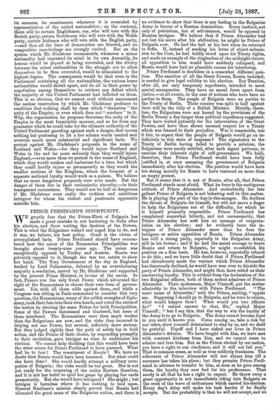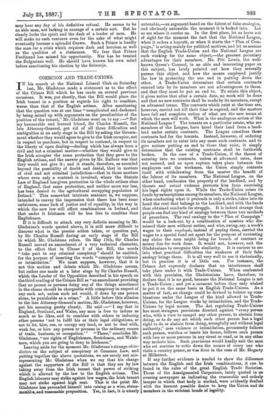PRINCE FERDINAND'S OPPORTUNITY.
WE greatly fear that the Prince-Elect of Bulgaria has made a great mistake in not hastening to Sofia after his election, and there waiting the decision of the Powers. This is what the Bulgarians wished and urged him to do, and it was, we believe, his best policy. Great is the virtue of accomplished facts. Prince Ferdinand should have remem- bered how the union of the Roumanian Principalities was brought about twenty-nine years ago. The union was energetically opposed by Turkey and Austria. Russia was privately opposed to it, though she was too astute to show her hand. The Tory Government of the day in England, hacked by Lord Palmerston, defeated by an overwhelming majority a resolution, moved by Mr. Gladstone and supported by the present Prime Minister, in favour of the union. In fact, France was the only Great Power which advocated the right of the Roumanians to choose their own form of govern- ment. Yet, with all those odds against them, and while a Congress was sitting in Paris summoned to consider this very question, the Roumanians, weary of the selfish wrangles of diplo- macy, took their fate into their own hands, and voted the union of the nation by electing the same Prince for both Principalities. Some of the Powers threatened and blustered, but none of them interfered. The Roumanians were then much weaker than the Bulgarians are now, and the risks they incurred in defying not one Power, but several, infinitely more serious. But they judged rightly that the path of safety lay in bold action, and the Prince of their choice, by responding promptly to their invitation, gave intrigue no time to undermine his election. We cannot help thinking that this would have been the wiser course for Prince Ferdinand to have pursued. What had he to fear ? The resentment of Russia ? We have no doubt that Russia would have been incensed. But what could she have done? She would hardly attempt a military occu- pation of Bulgaria; the risks would be too great. She is not yet ready for the reopening of the entire Eastern Question, and it is not her habit to spoil her game by playing her cards prematurely. But she would have intrigued V She might ; but intrigue is harmless where it has nothing to feed upon. General Kaulbars's mission clearly proved that Russia had alienated the great mass of the Bulgarian nation, and there is no evidence to show that there is any feeling in the Bulgarian Army in favour of a Russian domination. Every instinct, not only of patriotism, but of self-interest, would be opposed to Russian intrigue. We believe that if Prince Alexander had not lost his nerve after his abdication, he might be Prince of Bulgaria now. He had the ball at his feet when he returned to Sofia. If, instead of sending his letter of abject submis- sion to the Czar, he had boldly stood upon his Treaty rights, and made an example of the ringleaders of the midnight images, all opposition to him would have suddenly collapsed, and Russia would have had no plausible excuse for interfering. Prince Ferdinand is doubtless in a somewhat different posi- tion. The sanction of all the Great Powers, Russia included, is needed to give legal validity to his election. But Treaties, after all, are only temporary expedients, intended to meet special emergencies. They have no moral force apart from justice,—at all events, in the case of nations who have been no parties to them. The people of Bulgaria were no parties to the Treaty of Berlin. Their country was split in half against their will by the folly of a British Minister. Morally, there- fore, the Bulgarians were not bound by the provisions of the Berlin Treaty a day longer than political expediency suggested. They have waited patiently for the intervention of the Great Powers, and have thus shown unusual respect for a Treaty which was framed to their prejudice. Was it reasonable, was it fair, to expect that the people of Bulgaria would go on in-
definitely in this state of suspense The signatories to the Treaty of Berlin having failed to provide a solution, the Bulgarians were surely entitled, after such signal patience, to exercise their inherent right of self-government. We hold, therefore, that Prince Ferdinand would have been fully justified in at once assuming the government of Bulgaria immediately after his election. His position would have been too strong morally for Russia to have ventured on more than an empty protest.
But it seems that it is not of Russia, after all, that Prince Ferdinand stands most afraid. What he fears is the ambiguous attitude of Prince Alexander. And undoubtedly the late gallant Prince of Bulgaria is not behaving well in this matter. He is playing the part of the dog-in-the-manger. He declines the throne of Bulgaria for himself, but will not move a finger to help the Bulgarians out of the difficulty, for which he is himself primarily responsible. Prince Ferdinand has complained somewhat bitterly, and not unreasonably, that Prince Alexander has sent him no message of congratu- lation on his election ; and he evidently fears the in- trigues of Prince Alexander more than he does the intrigues or active opposition of Russia. Prince Alexander has still a strong party, especially in the Bulgarian Army, still in his favour ; and if he had the moral courage to brave Russia and return to Bulgaria, he might re-establish his position on a firm basis. He has, however, repeatedly refused to do this ; and we have little doubt that if Prince Ferdinand had chivalrously made the venture which Prince Alexander has timorously declined, he would have won over to his side the party of Prince Alexander, and might then have relied on their unswerving loyalty. This is evident from the declaration of the two Bulgarian officers, both of them ardent admirers of Prince Alexander. Their spokesman, Major Vinaroff, put the matter admirably in the interview with Prince Ferdinand. "The mere name of Alexander," said the Prince, smiling, " appals me. Supposing I should go to Bulgaria, and he were to return, what would happen then ? What would you two officers do I" "I cannot answer to that, Sir," replied Major Vinaroff ; " but I say this, that the way to win the loyalty of the Army is to go to Bulgaria. The Army cannot become loyal to you until it knows you. Come among no, take a risk for our sakes, show yourself determined to stay by us, and we shall be grateful. Popoff and I have risked our lives in Prince Alexander's defence. We have fought with him, we have met with constant kindness from him, and we cannot cease to admire and love him. But as the Prince elected by our nation, you have a right to our obedience, and it will not fail you." That is common-sense, as well as true soldierly frankness. The adherents of Prince Alexander will not abjure him till a successor has taken his place ; but they promise Prince Ferdi- nand in advance to transfer to him, as soon as he goes among them, the loyalty they now feel for his predecessor. That surely is all that he has a right to expect. He threw away a great opportunity in not immediately riding into Bulgaria on the crest of the wave of enthusiasm which carried his election. Every day's delay will make his task harder if he finally accepts. But the probability is that he will not accept, and we
may hear any day of his definitive refusal. He seems to be an able man, not lacking in courage of a certain sort. But he clearly lacks the spirit and the dash of a leader of men. He will make no rash ventures even for the sake of what might eventually become a splendid Crown. Such a Prince is hardly the man for a crisis which requires dash and heroism as well as the qualities of a statesman. We fear that Prince Ferdinand has missed his opportunity. Nor has he treated the Bulgarians well. He should have known his own mind before sanctioning his election by the Sobranje.



































 Previous page
Previous page